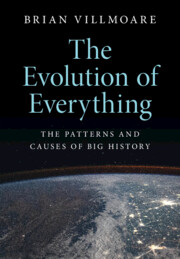Book contents
- The Evolution of Everything
- The Evolution of Everything
- Copyright page
- Contents
- Figure Credits
- Acknowledgments
- Chapter 1: Introduction
- Part I Introduction to the Scientific Perspective on the Past
- Part II Science and History
- Chapter 16: The Neolithic
- Chapter 17: States and Nations
- Chapter 18: Religion and Philosophy
- Chapter 19: The Enlightenment
- Chapter 20: The Industrial Revolution
- Chapter 21: Economics
- Chapter 22: Globalism
- Chapter 23: Modernity
- Chapter 24: Prospects for the Future
- Additional Readings
- Index
Chapter 20: - The Industrial Revolution
from Part II - Science and History
Published online by Cambridge University Press: 03 November 2022
- The Evolution of Everything
- The Evolution of Everything
- Copyright page
- Contents
- Figure Credits
- Acknowledgments
- Chapter 1: Introduction
- Part I Introduction to the Scientific Perspective on the Past
- Part II Science and History
- Chapter 16: The Neolithic
- Chapter 17: States and Nations
- Chapter 18: Religion and Philosophy
- Chapter 19: The Enlightenment
- Chapter 20: The Industrial Revolution
- Chapter 21: Economics
- Chapter 22: Globalism
- Chapter 23: Modernity
- Chapter 24: Prospects for the Future
- Additional Readings
- Index
Summary
After the Neolithic transition, arguably the most important economic shift was the industrial revolution. Prior to the industrial revolution, for the previous 10,000 years, the world relied (almost) exclusively on small-scale agriculture or pastoralism for economic production. The industrial revolution, starting largely with the development of the steam engine, had a profound effect on the material relationship of the individual to economic production, as individuals became part of industrial production. This change also had significant impacts on demographics: cities grew as the economics drove mass migrations away from rural areas to industrialized areas. Industrialization also had a long-lasting effect on politics, as workers organized to make improvements in working conditions and shift the power balance between labor and capital. Marxism was born of this struggle, and I explore the premises behind this philosophy, and the reasons for expansion as well as ultimate failure of this profoundly influential economic model. Here I speak to the contradictions between modern humanism and the authoritarian application of Marxism, drawing in the discussion on chaos and complexity and the difficulties with attempting central control on something as complex as a national economy.
Keywords
Information
- Type
- Chapter
- Information
- The Evolution of EverythingThe Patterns and Causes of Big History, pp. 303 - 318Publisher: Cambridge University PressPrint publication year: 2022
